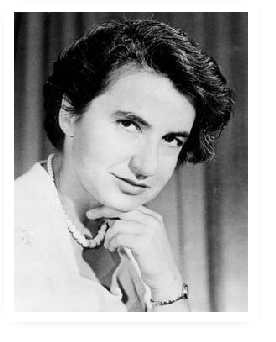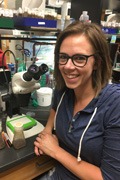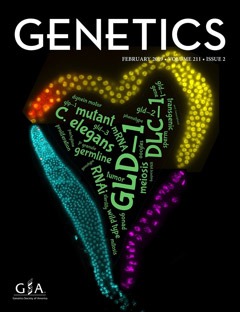Overview

In recognition of the groundbreaking contributions of Rosalind Franklin, the Rosalind Franklin Young Investigator Award for research in genetics is intended to inspire and support new generations of women in our field. The awards honor women in the first one to three years of an independent faculty-level position whose work displays originality and scientific creativity, leading to new discoveries.
The Rosalind Franklin Young Investigator Award is funded by The Gruber Foundation and is administered by the Genetics Society of America. Award winners are chosen by a jury of senior geneticists and previous awardees.
Every three years, two women are chosen to receive the Rosalind Franklin Award, and each awardee receives $75,000 over three years ($25,000 per year). One award funds genetics research in human and non-human mammals, and another award funds genetics research in non-mammalian organisms.
As of 2021, either three women geneticists will be selected or the annual amount for the two will increase to $37,500. If a third award is made it may be given in either of the two award categories.
Application Process
Women, who have started an independent faculty-level position (January 2019 – December 2021), may apply themselves or be nominated by a colleague, mentor, or department.
When the application period is open, there will be a link to the form at the top of this page. Please use this form to submit all materials; printed copies of any of these materials will not be accepted.
The application must include two letters of recommendation on the applicant’s behalf. These letters should be written by people who are familiar with the applicant’s work.
Recommenders should describe what distinguishes the applicant as an individual scientist, as opposed to describing her importance on a team of scientists. In addition, the recommender should describe the nominee’s scientific creativity and leadership skills within the lab.
When all materials have been received, a jury of senior geneticists and previous awardees will review the applications and select two recipients.
Eligibility
Applicants may come from anywhere in the world; US citizenship is not required. The applicant should be a woman in the first one to three years of an independent faculty-level position, and their work must display originality and scientific creativity. The applicant should be directing their own laboratory as an independent investigator and should be listed as the Principal Investigator for research being published from their laboratory.
Selection Criteria
Reviewers consider the following criteria when selecting a recipient:
- Is the applicant clearly building on her expertise through the years?
- Does the applicant show scientific creativity and leadership?
- Has the applicant demonstrated independence in developing their scientific research?
Important Dates
The 2021 application process to select the 2022 awardees is now closed. The next application process for the 2025 awardees will open in 2024.
The 2022 application deadline was May 28, 2021. Letters of recommendation were due June 2, 2021.
The award winners will receive a total of $75,000 distributed over three years, beginning in the year that follows the application and ending two years later. Awardees will receive $25,000 per year. For the 2021 application cycle, awardees will receive payments in 2022, 2023, and 2024.
Past Recipients
| 2022 | Aude Bernheim, INSERM Kara McKinley, Harvard University Viviane Slon, Tel Aviv University |
| 2019 | Bérénice Benayoun, University of Southern California Molly Schumer, Stanford University |
| 2016 | Maria Barna, Stanford University Carolyn McBride, Princeton University |
| 2013 | Mary Gehring, Whitehead Institute & Massachusetts Institute of Technology Valerie Horsley, Yale University |
| 2010 | Iiris Hovetta, University of Helsinki, Finland Jue D. Wang, University of Wisconsin–Madison |
| 2007 | Molly Przeworski, University of Chicago |
| 2004 | Amy Pasquinelli, University of California San Diego |
FAQs
Do I have to include a budget with the application?
No. Although a stipulation of the Rosalind Franklin Young Investigator Award is that it cannot be used toward salary for the recipients, it is considered an individual prize, rather than an institutional research grant. Therefore, you do not need to include a budget with the application.
Should I include figures in the explanation of the applicant’s current research?
Space is limited to 700 words, and figures may take up a sizable amount of this space. Unless the figure will clarify the research without adding significantly to the word count, we recommend that you do not include figures.
Should I include a reference list in the research description?
No. Because space is limited, you should not include a list of references with the description of research.
Do the references need to be Board certified in order to give the applicant a recommendation?
No. References are not required to be Board certified in genetics in order to write a recommendation. Research in genetics is sufficient.
You ask for two recommendation letters. I would like to submit a third. May I?
No. There is no provision for including more than two letters of recommendation.
Is there an age limitation for applicants?
Although there is no age limit for applicants, the award is targeted at women who are in the beginning stages of an independent research career. The objective is to support women who will be starting or have just started their own independent lab and will be the principal investigator on the research from that lab. Most likely, these will be women who have recently finished their postdoctoral research and are moving forward in their careers.
Do you “stop the clock” for maternity leave?
Yes. If you have passed the three-year deadline because you have taken time off for parental leave within the first three years of an independent position, we will take that into account and consider you eligible for the award.
I have just finished my postdoctoral research and have not yet found a position at a research institution. Am I eligible for the award?
The award is designed for a researcher who is already in or about to be in an independent research position. If you do not yet know where you will be located, you are not eligible for the award.
I have just finished my postdoctoral research and have just accepted a position at a research institution starting before December 31, 2021. Am I eligible for the award?
Yes. If you already have accepted an offer and will begin an independent research lab at any point in time from before the award is officially distributed (December 2021) —then you are eligible for the award.
I have not had a postdoctoral position; I went straight from PhD to an assistant research professor position. From there I went to a position where I now direct my own lab. Am I eligible for the award?
As long as you are within the first three years of an independent position (January 2019 – December 31, 2021), you are eligible. If you will be entering your fourth year before the award is officially distributed, you are not eligible for the award. The purpose of this award is to provide seed money to help a female investigator establish independent research in their own lab.
Do I need to be Board certified in genetics in order to be eligible?
No. Board certification in genetics is not a requirement for nomination.
I am an independent researcher within the first three years of directing my own lab, but I am not on the tenure track. Am I eligible for the award?
Yes. As long as you are within the first three years of your faculty appointment and you are doing independent research, you are eligible for the award, even if you are not on a tenure track.
Is the award money given to the individual or the institution that the individual is with?
The awards are unrestricted, with the limitations listed below, and may be used for any purpose that advances the genetics research of the recipients. Recipients may choose to receive payment directly or to have it sent to their research institutions. If recipients choose to receive payments directly, they are responsible for all applicable taxes on the monies.
Are there any restrictions on how recipients may use the funds?
Recipients may only use the funds for expenses related to their research program. They may not use the funds to support their salary or to support institutional overhead or indirect costs. The research that is supported by these funds must meet all applicable legal, ethical, and regulatory standards.



